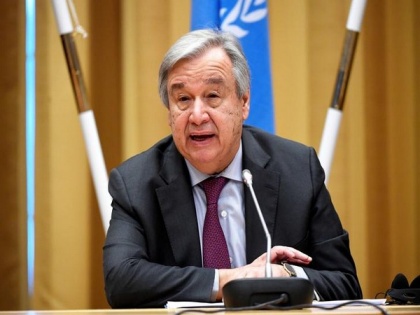UN chief calls for nuclear weapons-free Middle East
By ANI | Published: November 30, 2021 01:44 PM2021-11-30T13:44:55+5:302021-11-30T13:55:07+5:30
UN Secretary-General Antonio Guterres on Monday called on all Middle East States to transform the vision of a region with no nuclear weapons, or other weapons of mass destruction, into a working reality.

UN chief calls for nuclear weapons-free Middle East
UN Secretary-General Antonio Guterres on Monday called on all Middle East States to transform the vision of a region with no nuclear weapons, or other weapons of mass destruction, into a working reality.
Antonio Guterres was speaking in New York at the second session of the Conference on the Establishment of a Middle East Zone Free of Nuclear Weapons and Other Weapons of Mass Destruction.
Since 1967, five such zones have been established around the world: Latin America and the Caribbean, the South Pacific, Southeast Asia, Africa and Central Asia. They include 60 per cent of all UN Member States and cover almost all of the Southern Hemisphere.
For the Secretary-General, expanding such zones would help build a safer world.
"That is particularly the case in the Middle East, where concerns over nuclear programmes persist, and where conflicts and civil wars are causing widespread civilian casualties and suffering, undermining stability and disrupting social and economic development", Guterres explained.
The UN chief also reiterated his call for all parties to exercise restraint and avoid escalation.
In this context, he highlighted the Joint Comprehensive Plan of Action (JCPOA), known commonly as Iran Nuclear Deal, saying that the return to dialogue is "an important step."
The JCPOA was signed by Iran alongside the European Union and five permanent members of the Security Council: China, France, Russia, the United Kingdom, and the United States. However, Washington withdrew in May 2018, under the previous administration. Talks over Iran's nuclear programme and a revival of the JCPOA, have resumed this week in Vienna.
"All parties must ensure this valuable instrument remains effective", he argued.
For Guterres, the positive consequences of the Middle East being free of nuclear weapons would extend beyond nuclear control.
"It will strengthen the international bans on chemical and biological weapons. It will build trust, reduce tensions and prevent conflicts and human suffering", he argued.
According to him, it would also deescalate regional arms races and free much-needed resources to tackle major challenges, including COVID-19, climate change, and achieving the Sustainable Development Goals.
( With inputs from ANI )
Disclaimer: This post has been auto-published from an agency feed without any modifications to the text and has not been reviewed by an editor
Open in app